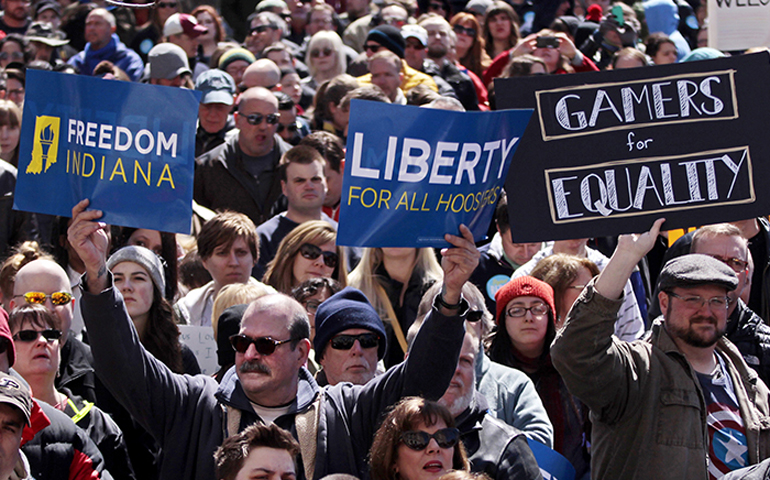
Demonstrators gather at Indianapolis' Monument Circle on March 28, 2015, to protest a religious freedom bill signed by Indiana Gov. Mike Pence. More than 2,000 people gathered at the Indiana capital to protest the bill, saying it would promote discrimination against individuals based on sexual orientation. (Reuters/Nate Chute)
When Congress passed the Religious Freedom Restoration Act in 1993, the American Civil Liberties Union supported it because we believed it would provide important protections for people to practice their faith.
Having fought for religious liberty for decades, we were troubled that the interpretation of the Constitution at the time did not sufficiently protect minority faiths. Over the years, we have used the Religious Freedom Restoration Act to fight for religious rights, most recently on behalf of a Sikh student, Iknoor Singh, who was barred from entering the Army Reserve Officers' Training Corps unless he cut his hair, shaved his beard and removed his turban.
But today the Religious Freedom Restoration Act is being used as a vehicle for institutions and individuals to argue that their faith justifies myriad harms -- to equality, to dignity, to health and to core American values. For example:
- In 2014, a federal magistrate judge cited the Religious Freedom Restoration Act in ruling that a member of the Fundamentalist Church of Jesus Christ of Latter-Day Saints could not be required to cooperate in an investigation of child labor law violations. (Church leaders were accused of removing children from school and forcing them to harvest pecans on a private ranch, without pay, for eight hours a day.)
- The Catholic Medical Association in Michigan is using the Religious Freedom Restoration Act to argue that Catholic hospitals cannot be required to provide abortions in case of emergencies. (The U.S. Conference of Catholic Bishops claims that even though it receives federal money to provide services to unaccompanied immigrant minors, RFRA justifies its refusal even to inform unaccompanied immigrant minors who are pregnant that abortion is an option.)
- Religiously affiliated nonprofit organizations recently argued before the Supreme Court that the Religious Freedom Restoration Act is violated if they are required to take the simple step of notifying the government that they object to providing insurance coverage for contraception to their employees. (On Monday, the court sent the case back down to lower courts to reconsider.)
Many states are looking to the Religious Freedom Restoration Act as a model for similar legislation, with proponents often saying the measure is necessary so anyone, including businesses, may for reasons of faith refuse to provide services for same-sex couples.
In all these cases, people suffer harm. Yet causing harm to others is not what religious liberty is about.
On Wednesday, May 18, Congress introduced legislation to fix the Religious Freedom Restoration Act -- to bring the law back into line with its original intent. The "Do No Harm Act," if passed, would amend the Religious Freedom Restoration Act to ensure that federal law protects religious liberty but does not let religion be used -- or misused -- to harm others.
It would ensure that the Religious Freedom Restoration Act cannot be used to defeat protections against discrimination, to skirt wage and labor protections, to avoid compliance with laws protecting against child abuse, or to thwart access to health care guaranteed by law.
We recognize some people's heartfelt beliefs may conflict with the law. Business owners who believe marriage is the union between a man and a woman may not want to serve same-sex couples, and company owners may object to their insurer providing employees insurance coverage for contraception.
But our path forward may be easier if we look backward for guidance. In decades past, businesses and schools went to court to resist racial integration. Religious schools argued for the right to pay women less than men because, consistent with their faith, men were the heads of households. As a nation, we said no. Religion couldn't be used to discriminate and to harm a person's dignity, equality or opportunity.
The bill introduced in Congress today asks us to do the same. As Georgia Gov. Nathan Deal said in vetoing a state RFRA bill earlier this year, "I do not think we have to discriminate against anyone to protect the faith-based community."
[Louise Melling is deputy legal director of the American Civil Liberties Union]
